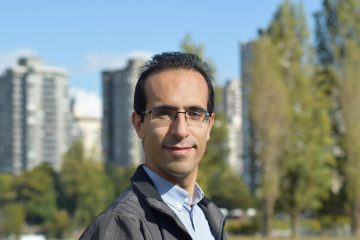
When Amir Abdi speaks about teaching and being an instructor, one thing is clear: he loves it. Amir’s passion and dedication to teaching has not gone unrecognized. He was the recipient of the Killam Graduate Teaching Assistant for the 2017/2018 school year.
“It is indeed an honour to be the recipient of the Killam GTA award and I’m humbly grateful that my efforts have not gone unnoticed,” says Amir.
The award is awarded annually by UBC and recognizes graduate students for their outstanding teaching, research and service to the community. Amir is currently a PhD student in the Department of Electrical and Computer Engineering, co-supervised by Dr. Sidney Fels and Dr. Purang Abolmaesumi.
Amir’s fondness for teaching has continually pushed him to become a better instructor. He acknowledges that there is no one-size-fits-all approach to teaching and learning. Instead, he recognizes that his role is fluid and he has to adapt to the needs of his students.
“The most vital thing I learned was to respect students’ differences in their approaches towards learning,” explains Amir. “Our learning tactics are not necessarily in sync with one another, which makes it challenging as you naturally expect your audience to learn along the same path as you did. That’s when you need to switch roles, put a facilitator’s hat on, and let the students go through a self-paced learning process in a flipped classroom setting.”
Amir, a computer engineer, has not taken a traditional path to become a PhD candidate at the Department of Electrical and Computer Engineering. His interdisciplinary background in dental surgery and computer engineering has helped shape his research path.
“I am hoping to make an exciting fusion between what is known as reinforcement learning with the worlds of biomechanics and dentistry.” says Amir. “I am investigating the possibility of predicting the outcomes of clinical interventions on the patient’s jaw based on a functional biomechanical model of the subject. The end goal is to create a virtual surgery tool that provides the clinicians with feedback regarding the post-operative quality of life of patients.”
Although his love and passion for teaching and research will likely steer Amir towards a path in academia, he’s also had the opportunity to explore the possibilities and potentials of being an industry researcher as a PhD intern in Google.
“It is hard to ignore the tempting opportunities of industry because I like to build stuff,” he acknowledges. “But I see myself aiming for a faculty position sooner or later.”
“Regardless, I will be where I can make the most contributions and feel more productive.”